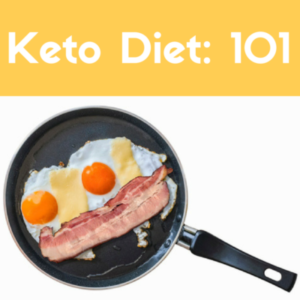|
|
|
|
|
Have you heard about the latest diet—the Ketogenic Diet? Fad diets never seem to end.
This month I’m breaking down the ketogenic diet. I’ll explain what it is, why people lose weight, and the pros and cons.
Do you have questions about the ketogenic diet? Send me an e-mail.
- Stephanie
|
|
|
|
 What is the Ketogenic Diet? What is the Ketogenic Diet?
The ketogenic diet is a high fat, low carbohydrate, moderate protein diet. Therapeutic use of the ketogenic diet dates back to the early 20th century for controlling seizures in people with epilepsy. There are theories, however it is still unclear how it helps manage seizures.
When severely limiting intake of carbohydrates, the body relies on fat for fuel by way of ketones and enters a state of ketosis.
Ketosis 101
This is a very simplistic overview for those interested in how ketosis works.
Nearly 100 percent of carbohydrates break down to glucose—the body’s efficient and immediate fuel source. All cells need glucose for energy and when glucose needs are met, excess glucose is stored as glycogen—about a day’s worth. (If there is more glucose, it is converted and stored as fat.)
When carb intake is severely limited and replaced by fat (or protein), the body uses its stored glycogen to get the glucose it needs. (By the way this is what happens in starvation also.) Once depleted of glycogen, the body relies on protein (food protein or body protein, like muscle) for glucose but for a short time, a few days.
Protein has many important functions and to save it and not ‘waste’ it on creating energy/glucose, ketones come to the rescue. This varies from person to person but usually about three to four days after low carb intake (less than 50 grams, even less than 20g for some people). The liver converts fat to ketones where the body utilizes them as an alternate fuel source. Over time, the body is efficient at metabolizing fat for energy (by way of ketones versus glucose from carbohydrate). This metabolic state is ketosis.
Ketosis forces the body to burn fat for energy rather than carbohydrate. This might seem appealing and you may be wondering—why not?
Short term side effects of ketogenic diet:
- Fatigue
- Fruity smelling urine
- Bad breath
- Constipation
- Low-grade acidosis
These effects tend to improve when the diet is continued, as the body adapts to the new diet and adjust the ways in which it sources energy, however there are long term complications that could result.
Long term complications that could result from the ketogenic diet:
- Kidney stones
- Constipation
- Vitamin and mineral deficiencies
- Increased cholesterol
- Decrease in muscle mass
- Loss of bone density
Why do people lose weight?
People lose weight for a few reasons on the keto diet.
- Water weight: The immediate weight loss is water. When depleting the body of glycogen, fluid is lost. For every gram of glycogen we have, we store three to four grams water. Lose glycogen...lose weight! But it’s just water.
- Loss of appetite: The state of ketosis is actually a survival mechanism for those having no access to food, people who are starving. Do you want people to be hungry if they have no access to food? No. Because then they would be foraging for food, increasing metabolism. So ketosis may actually slow metabolism in addition to suppressing appetite.
- Limited food choices: Like the heyday of the Atkins diet people lost a lot of weight! Was it the magic of Atkins? Weight loss was partly due to numbers 1 and 2 above but also fewer choices. If a typical meal was a 16 ounce ribeye, baked potato with cheese, sour cream, butter, and bacon, plus dessert and you take away the loaded baked potato and dessert (because they’re carbohydrates), of course weight will be lost. Similarly the ketogenic diet works by eliminating entire food groups. Limited food groups, limited choices. Fewer foods, fewer calories = weight loss.
Is it sustainable?
It’s a diet. Some people do okay with the limitations, others not so well. In one meta-analysis of 13 randomized controlled trials, there was a nearly 40 percent dropout rate.
Read on as I share my thoughts. |
|
|
|
|
| Pistachio Apricot Powerballs |
|

By: American Pistachios
Serves: 10
Ingredients:
- ¾ cup shelled unsalted pistachio nuts
- 1 cup ready-to-eat dried apricots
- 2 tablespoons rolled oats
- 1 teaspoon Chia seeds
- 4 teaspoons peanut or other nut butter
Instructions:
Put all the ingredients in a blender and blitz until well combined. With wet hands, squash the mixture into balls about the size of a walnut. Store in an airtight container for 4 days.
Preparation Time: 5 minutes
Nutritional Information per Serving (based on 10 servings): 135 calories, 4.5 g protein, 8.5 g fat, 1.5 g saturated fat, 8 g carbohydrates, 2 g fiber, 5 g sugar, trace sodium.
Article References:
- Bueno, NB et al. British Journal of Nutrition (2013), 110, 1178–1187 Very low carbohydrate ketogenic diet versus low fat diet for long term weight loss: a meta-analysis
- Veech, Richard L. "The therapeutic implications of ketone bodies: the effects of ketone bodies in pathological conditions: ketosis, ketogenic diet, redox states, insulin resistance, and mitochondrial metabolism." Prostaglandins, leukotrienes and essential fatty acids 70.3 (2004): 309-31.
- E. F. Hobdell and L. Tonyes, “Diets for epilepsy,” Touch Briefings: US Pediatric Review, vol. 2, pp. 45–46, 2007 “Short-term adverse effects include dehydration, mild metabolic acidosis. Long-term adverse effects include nephrolithiasis, constipation, vitamin and mineral deficiencies, increased cholesterol, retarded growth in young children, and decreased bone mineral density”
| |
| |
|
"Low-carb versus low-fat should not be the focus for people selecting a weight loss diet. The focus should be on improving the quality of food that people eat instead.”
- Deirdre Tobias, associate epidemiologist at Harvard Medical School and Brigham and Women's Hospital. |
|
|
|
| Keto As Your Weight Loss Solution? |
|
|
If the above article, still has you thinking, “Maybe this is my solution for summer weight loss?” Let me share my thoughts.
The ketogenic diet is another fad diet. My experience with fads are that people lose weight for a short term, realize the diet is not sustainable and gain the weight back (often plus some). They feel as if they failed.
No. No. No. You did not fail. The diet failed you!
My passion for this work comes from seeing clients succeed. I love hearing when clients reach their goals and FEEL amazing in their life. The reward comes watching clients find their optimum healthy place by feeling good both emotionally and physically.
Creating a healthy life is a journey. It is finding the balance of food that nourishes both body, mind, and soul. That means learning how to eat and enjoy pizza with friends and cupcakes with your kids.
Following a keto diet takes a lot of work and energy. Lots of prep and planning to make sure you’re eating enough fat, the right amount of protein and calculating carbs to not exceed the 30 - 50 gram limit to stay in ketosis. (Some people need even less to stay in ketosis.)
Do you know how few 50g carbs is? Think an apple and sweet potato. The carbs on a keto diet usually are exclusively veggies—not a bad thing. Generally no grains, no fruit, no milk or yogurt, and no sugar. Does this sound healthy and balanced? I don’t think so. Also, following a ketogenic diet is very expensive and the lack of variety can get downright boring.
All too often I hear of people who follow the ketogenic diet gain all their weight PLUS some after they go “off” the diet. No surprise because the ketogenic diet is not teaching how to live in real life. Instead it’s teaching how to live controlled by a diet.
If you are looking to create a plan to achieve long term weight management and health success, contact me...I’ll help you get there!
|
|
|
|
|
| ABOUT SO Nutrition |  | Stephanie Leipprandt Ouellette, MBA, RDN, LD Stephanie has been working in the field of nutrition and dietetics since 1995. She earned a Bachelor of Science degree in Dietetics from Michigan State University, completed an Approved Pre-Professional Practice Program at Western Michigan University and earned a Master of Business Administration from Baker College. She’s been a Registered Dietitian Nutritionist since 1996 and licensed in Texas since 2007. In 2008, Stephanie earned her certification in Childhood and Adolescent Weight Management. Stephanie has extensive clinical & managerial experience, both in corporate settings and in the community. Now she wants to share her knowledge with you, because most (if not all) nutritional habits begin at home.
Stephanie and her family reside in Katy, Texas
|
|
| Copyright © 2017 Customized Nutrition Newsletters, All rights reserved. |
|
|